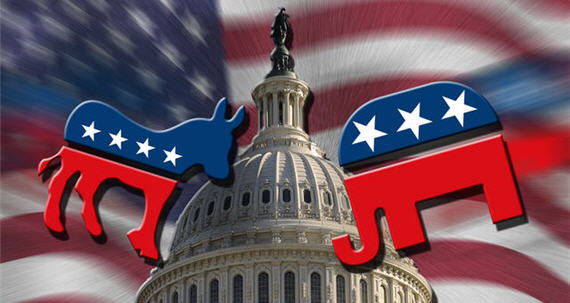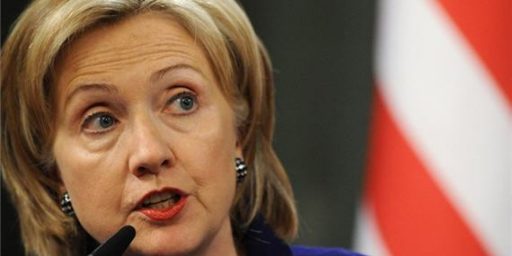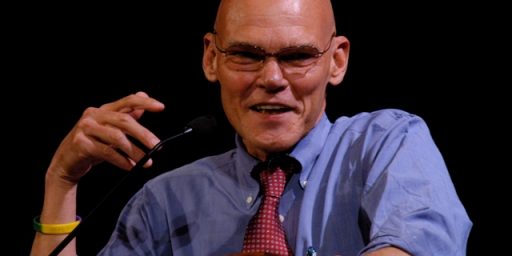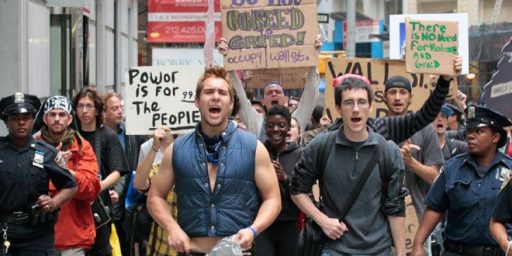The End Of America’s Political Parties?
Are America's political parties become irrelevant?
Walter Russell Mead looks around and sees America’s two major political parties at a crossroads:
The decay of American political parties continues as the real money and power in politics shifts inexorably away from party organizations to informal and ad hoc groups. The combination of citizen grassroots movements, decentralized party structures and the vast sums of money short-circuiting the official party structures is changing the way politics works. As this story in the New York Times details, the real conversation among Republican-affiliated power brokers now takes place outside party structures.
American political parties are increasingly being reduced to flags of convenience; party organizations and party institutions have little influence over events. That didn’t use to be true. Party leaders and officials once exercised significant power over the choice of nominees, over the careers of aspiring pols, and over patronage. These days, outside Chicago and a handful of other places, we no longer think of party “bosses”.
To some extent, there’s a phenomenon that’s been going on for many years. Neither political party is as centrally controlled as it was in the past and, except perhaps in cities like Chicago and Philadelphia, the idea of an old-style party machine that holds a tight leash on voters, party members, and officeholders is largely a thing of the past. Several factors seem to be accelerating things now, though. Technology is certainly one factor, but so is the rise of independent groups outside the major parties with the ability to raise huge amounts of money and spend them on behalf of candidates:.
At a time when the Republican National Committee remains weighed down by debt, outside conservative groups, freed from contribution limits by the Supreme Court’s Citizens United decision last year, are playing an ever larger role and operating in an increasingly coordinated fashion. In the coming months, the conservative groups will consult among themselves as they open pre-election advertising barrages against Mr. Obama and Congressional Democrats.
They have begun conversations about how to divide up the swing states where each group is likely to focus its energies, with some like Americans for Prosperity expecting to shift chiefly to Senate races and the White House. Others, like the new Congressional Leadership Fund, will look to preserve the Republican hold on the House.
Groups that have made defeating Mr. Obama their top priority expect to invest heavily in some of the new swing states where Mr. Obama made inroads in 2008, like Colorado, Nevada and New Mexico. Other groups, operating in concert, will target Democratic senators they believe are ripe for unseating, like Bill Nelson of Florida, Claire McCaskill of Missouri and Sherrod Brown of Ohio.
At a time when the Republican presidential primary race has featured increasingly tough stances against illegal immigration, the independent groups have begun an aggressive program of outreach to Hispanics, hoping to offset Democratic gains among a critical voting bloc.
And they are planning to coordinate offensives in states like North Carolina and Pennsylvania, where money and organizing could pay dividends simultaneously in the presidential, Congressional and local legislative races.
They have recruited some of the Republican Party’s best-known officials, like Speaker John A. Boehner and Gov. Haley Barbour of Mississippi, to help raise money. And in a shift from 2010, when the groups focused largely on television advertising, they plan to put far more money into voter contact, social media and grass-roots outreach, hoping to buttress the party’s own get-out-the-vote work.
Such heightened coordination is the latest development in the growing role of the outside groups, which operate free of many of the legal restrictions that govern the official parties.
Some of these groups are the so-called Super PACs that nearly every Presidential candidate has had formed on their behalf at this point. Not only do they allow people to donate on behalf of the candidate’s election outside of direct contributions to the campaign, they also operate wholly independent of the RNC, which probably isn’t a bad thing considering that they’re still trying to figure out how to pay off the debt that Michael Steele left them with. In any even the ability of insiders from either political party to influence party politics seems to be deteriorating at a faster rate. In a prior era, you never would have seen nominees like Christine O’Donnell, or party frontrunners like Herman Cain. Both cases, Mead argues are a result of the decline of party structure and the rise of populism:
The appearance of unconventional figures in politics is one reflection of this trend. Strong party machines tend to produce dull and forgettable candidates. A candidate selected by a party machine might have to tell voters that “I am not a crook;” such a candidate would probably not need to make a television commercial to explain to voters that “I am not a witch.” Populist politicians tend to be more flamboyant; they have to be able to mobilize their followers. From Jesse Ventura to Al Franken and Sarah Palin, we are seeing more politicians whose ability to command attention and mobilize the base counts for more than their ability to rise patiently through the ranks of a party machine.
Mead also argues that weak political parties also mean that money becomes more important to political success. Without the support of a strong party structure, candidates must rely more and more 0n donor networks, PACs, and, now, SuperPACs in order to raise the money that they need to win elections. It’s also the kind of system that makes it easy for people to achieve political success based on familial ties or celebrity status (in some sense the pseudo candidacy of Donald Trump was the perfect example of that last fact).
All of this, Mead contends, poses a serious problem:
While I cannot call the age of Boss Tweed a golden age of American political virtue, populism, plutocracy and dynasticism have traditionally been seen as signs that a republic is in trouble. The rise of populism means that a gap has opened up between the leadership elite of a society and ordinary voters. Alienated from a system that is no longer seen to be working, populist voters believe that the system and the establishment are the enemy. Clearly, an establishment which allows such a climate to flourish is an establishment without the skills or the character to lead.
(…)
The decline of party structures leaves our politics less coherent and more subject to rapid mood swings. There is not much to be done about the underlying trends driving the process; Americans are becoming more individualistic and more enamored of direct democracy all the time. But our political institutions have a lot that they need to accomplish in the next few years; as the old forms of political organization wither away our society needs to find new ways to make the political process more coherent.
Otherwise we risk something like a national version of California’s political death spiral: dissatisfaction with the status quo leading to populist interventions that make the political system more dysfunctional, increasing voter dissatisfaction, and so on down the chute.
Frankly, I’m not sure what we can do to reverse that course. As Mead notes, American voters are becoming more independent and individualistic than ever before, the idea that we’d be able to return to the generally unified party discipline of 40 or 50 years ago seems unlikely. Additionally, public dissatisfaction with government in general suggests that it’s going to be a long time, if ever, before either political party commands the kind of credibility it used to. A recent New York Times poll found, for example, deep economic pessimism and distrust in government institutions. Three quarters of Americans believe the country is on the wrong track, a number nearly as high as it was at the height of the 2008 economic crisis. Recent polls indicate that the public has the same generally negative opinion about President Obama and the Republicans in Congress. Taking all of that into consideration, it’s hard to see the pubic regain it’s faith in the major parties any time soon.
Mead doesn’t seem to know what the solution is here and, honestly, neither do I. Our problems run deeper than the fact that the major political parties have been weakened. In fact, it’s probably more accurate to say that this is a symptom of wider problems for which there may be no cure. The ironic thing about it, though, is that our political culture seems to have become more partisan and poisonous. Perhaps that’s a reflection of the populism and the influence of independent entities that don’t give a whiff for the good of the party. Whatever the cause, though, it’s the primary thing that seems to be destroying us right now.







My simple answer to the headline question is: No.
A few quick thoughts:
1) “Political party” does not equal “party organization.” Mead makes a mistake here.
2) In fact, parties in the US have long be organizationally quite weak. Indeed, we were just talking in class yesterday about the “weak and uncohesive” nature of US political parties.
3) Heck, in some ways parties in the US have become more important since the realignment of 1990s.
I don’t find this convincing. As you note, some weakening of the traditional parties happened a long time ago already. The nomination, and election, of someone like Jimmy Carter – a complete unknown to the DC based establishment – is a clear sign of a weak party, and that was 35 years ago.
On the other hand, the parties seem to be quite strong when it comes to enforcing discipline in the halls of Congress. It seems to be very difficult, especially for Republicans, but for Dems too, to wander very far off the reservation, even when their own interests, or the interests of their constituents are being ignored.
In general, I think he has a rather narrow view of the the parties – thinking of them only as their official bureaucracy – the DNC or RNC. In a larger sense though, all these “independent” PACS and superPACS and other vehicles are certainly coordinating with eachother, and are functioning as a party in a lbroader sense.
Well, given that 98% of state governors, 98% of U.S. Senators and 100% of U.S. Representatives (with one vacancy at present) are members of one of the two political parties it would appear the political parties are pretty darn relevant. QED.
Concerning so-called insurgent candidates and the ways in which they’ve allegedly shaken up the system you have to keep in mind that’s a function of the very peculiar demographics of the GOP primary bases, not outside PAC money. Then for every Christine O’Donnell and Sharron Angle there are a half-dozen Mark Kirks and Rob Portmans. Over the long haul the inmates don’t actually run the asylum.
I think Mr. Taylor makes a wise observation in distinguishing party from party organization. Anyone from Chicago, like me knows in their gut the difference.
As for the broader question, we could only wish it so. I’ve long believed that if a party with a conservative/libertarian bent on economic issues and a primarily libertarian bent on social issues could be forged it would reign supreme for 50 years. Unfortunateley we have the conservatives wanting to meddle on social issues, and the liberals wanting to meddle on economic issues.
Result: disfunction approaching a train wreck.
Drew,
“I’ve long believed that if a party with a conservative/libertarian bent on economic issues and a primarily libertarian bent on social issues could be forged it would reign supreme for 50 years. Unfortunateley we have the conservatives wanting to meddle on social issues, and the liberals wanting to meddle on economic issues.”
That might be a hint that your particular policy preferences are nowhere near as popular as your think they are.
Uh, Mead seems to really be talking about dysfunction in the Republican/conservative/rich people element of our polity, not problems that are genuinely shared across the political spectrum.
Mike
Moosebreath –
You may be correct, but I don’t think so. Every so often those “test your leanings” things go out. Answer 50 questions etc. Almost invariably, the vast majority end up where I’m describing. Unfortunately, at election time most people end up being polarized prisoners to neanderthal stereotypes. Just look at the comments sections at this blog.
BTW – I’ve got a dentist who can fix your problem…….
The political parties are little more than red and blue tribes that in the end represent the same plutocrats. It’s simply tribal warfare – a team sport.
The political parties are going to stay, but what I am surprised is that you did not talk about the possibility of a third-party becoming much more mainstream or mainstream enough to take on Democrats and Republicans. The problem that is rising right now is that both parties have their flaws and those flaws go toward money and power. They have the same problems. In essence, this may be the perfect time for a third party to rise and take over some seats in the House and Senate. But that party would have to go to the hurdle of getting PACs and SuperPacs as well, which may hurt their creditability.
For the federal government today (and local governments as well) it is about the power of political parties, and not necessarily about representatives and constituents. The news will always describe how the Republican House blocked a bill or the Democratic Senate passed a bill. And in fact, media has been beating into American’s minds about how there are are only two types of politicians (political-party wise). Solving this problem, or at least slowing down this downward spiral of American Politics will be very difficult and will take a long, long time.
This seems to be mainly a Beltway concern. No one who is actually involved in Third Party politics would say that the 2-party system is dissolving. There is a resurgence of public interest in politics. But until we have a change in the affiliation of representatives (as Tsar said above), this is not an issue. I’m betting that the Green, Libertarian, Independent, etc parties will have just as much interference at the state level from the main two parties in 2012 as they always do
But it is a good thing if the establishment politicians are getting nervous.
@Eric: Before a third party would be able to come to the fore, there would need to be some kind of implosion or other breakdown in the function of a major party that would cause members of that party to abandon it. (Note: The enthememe in the preceding is that most voters are not actually “independent;” they are simply less inclined to loyally follow their party through thick and thin. Most independents seem to vote either one way of the other most of the time, but they are flexible enough to be swayed.) We may yet see such a breakdown, and the GOP is the most likely site, but I don’t think the Tea Party has any more stamina than most movements of the disaffected.
My personal take on what is different now is that the plutocrats among us have become so wealthy that they are now able to access the system without needing to align with one party or another. What is happening at the moment is what we call in retail “cutting out the middle man.” While they still belong to and support the parties of their choice (and no, I didn’t mistakenly say “parties” instead of “party”), they don’t “need” the party to get their agendas through the system anymore, they can also buy direct access. We may be seeing the creation of a new and different political machine.
Drew,
Your comments remind me of bithead’s repeated assertions that if the Republicans nominated a True Conservative, they would win in a landslide every time. Political parties are there to elect candidates and enjoy the perqs that come as a result, not to push any agenda. If they believed that nominating people who are libertarian on both economic and social issues would get them more votes than they would lose, they would do so in a heartbeat. The fact that they generally do not, and generally such candidates do poorly when they are nominated, is strong evidence that, whatever a bunch of geeks who take political tests on the internet say, the majority of the voters are not there.
And a dentist cannot fix my problems. I just like eating ferns too much.